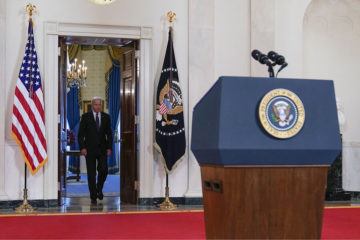Howard LaFranchi in The Christian Science Monitor:
 For decades, the Democratic Party has stood by Israel in times of war and peace.
For decades, the Democratic Party has stood by Israel in times of war and peace.
Today, that support no longer looks so solid. In the Democratic-controlled Congress, more lawmakers are calling out Israel for its actions in its latest conflict with Hamas that ended in a cease-fire last week. And this poses a dilemma for President Joe Biden, a staunch ally of Israel who has vowed to make human rights a priority, not an afterthought in his administration. On May 15, after the U.S. blocked United Nations efforts to seek a cease-fire in Gaza, where Israeli airstrikes had leveled residential buildings in retaliation for Hamas rockets, New York Rep. Alexandria Ocasio-Cortez, a Democrat, issued a caustic tweet. “If the Biden administration can’t stand up to an ally,” meaning Israel, “who can it stand up to? How can they credibly claim to stand for human rights?”
Ms. Ocasio-Cortez and other Democratic critics say the United States looks hypocritical for standing unwaveringly by Israel even as it took actions in Jerusalem, the West Bank, and Hamas-controlled Gaza that a mounting international chorus condemned as gross violations of Palestinian rights. And it’s not just firebrands in Congress who are challenging Mr. Biden to steer away from a traditional “Israel first and unquestioned” approach to the Israeli-Palestinian conflict and toward a more nuanced and balanced approach that puts human rights at the fore.
Democratic Sen. Bob Menendez of New Jersey, chairman of the Senate Foreign Relations Committee and a longtime staunch Israel supporter, issued a statement on the same day as Ms. Ocasio-Cortez’s tweet. He called out Israel for “the death of innocent civilians” and for targeting a Gaza high-rise in which international media outlets had offices. Taken together, this amounts to a wake-up call for the White House that the Democratic Party has now shifted on how it sees the Israeli-Palestinian conflict and the U.S. role in addressing it.
More here.
